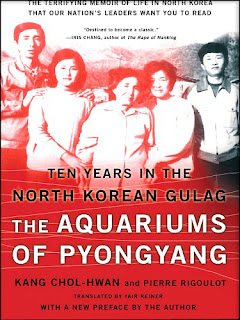Overall the group had high expectations of this book and were left disappointed. Most had very little knowledge of North Korea and it served as a good introduction to the country but lacked any emotional connection. The text was accessible and easy to read but felt a bit like a school history book. Several of us felt a bit guilty for being bored by Kang’s story. At times, it even seemed he wasn’t that bothered by many of the things that were happening. We wondered if his detachment was due to his culture, being guarded with emotions and opinions all his life or if something was lost in translation. Or a little bit of both. Other books about gulags have been much more emotional.
The story was originally told orally by Kang in Korean to a translator who then translated it into French for Pierre Rigoulot who wrote the memoir. Then it’s been translated again into English. Some of the word choices seemed incorrect to the group and poor use of grammar in places. The use of human instead of humane for instance. The story has not been turned into a novel and therefore lacks a bit of dramatic tension. It stays honest, perhaps because it was so important to Kang to get the truth out of North Korea, but this meant it didn’t grab anyone. The sense of time was also off; it didn’t feel like 10 years had passed and it often jumped around illogically. Where he would go off on a tangent to things that happened later on, he would suddenly be back on day one.
The matter of fact style meant we found the story believable, relentlessly so, and didn’t really doubt his account. Some of the group were expecting to be more shocked and felt he had it easy compared to what others went through.
None of the people described in the book were very well developed and most of them were just names to us, not fully fleshed out individuals. Kang was vague on details which left people like the guards and teachers, who should have been real villains, a bit flat and he even admitted to not knowing his sister very well. The nature of the culture and his circumstances may have contributed to the lack of information on other people and neither he nor Pierre wanted to elaborate. We wanted to know more about his mother and how she was forced to divorce his father, but again, it was rushed through. Someone thought the grandmother should have been a central character, as it felt she was at the heart of the family and kept them all going, but again, she wasn’t developed. There just wasn’t any insight given into them as people.
At first, no one really thought there were any passages that stood out to them but after thinking, quite a few were picked out, although mostly we wanted them to have been more in-depth. It seemed at its cruellest when the agents came to break the news of his mother’s forced divorce. It was severe, taking away all hope and highlighted how horribly they treated people. When women got pregnant, the descriptions of what happened to them seemed like real torture; was a bit more gruesome and had more impact than other descriptions. Some wanted to learn more about the gang culture; that prisons were worse than the gulags but it only touched briefly on the subject. The family’s initial decision to leave Japan and return to North Korea involved the reader the most out of everything that was described.
Interestingly, some found humour amongst the pages. The chapter of self-criticism described practices that were almost absurd. Having to learn passages about the great leader, reciting them as if he were a god. There was also the ignorance of the guards and teachers to the regime. Would they have even noticed if they said the wrong words? Yet the students were punished for correcting. The reactions to the world outside North Korea were also interesting. China is hardly the most liberated country yet when they went to bars they were so shocked at the behaviour of people. Behaviour that seems perfectly normal to us. This highlighted that we take our freedoms for granted. Think of how many times a day you complain about the government?
A few of us felt that the final third was more of an adventure and the book picked up after a boring middle section. The ending was a bit anti-climactic. It was so easy for them to get out of North Korea too; they just walked across the river and that was it. It was commendable that Kang chose to spend his time helping other renegades and the book was obviously his sounding board. It did briefly show how hard it was for North Koreans to acclimatise but it was overall a bit uninspiring. We felt that the current edition could have done with an update in the form of an epilogue as the original translation is from 2001. It would be interesting to know what has happened in the meantime.
Everyone agreed the writing style was awkward, bland even, and lacked anything that would make us want to read more by the authors. It was a shame that such an important and tragic tale was so badly told. It highlighted our ignorance of things that are happening in the world and left us wanting to read more about North Korea.
15 ratings
5.3 average (highest 7, lowest 3). Some people gave it higher marks for the interesting subject matter over the quality of writing
5.3 average (highest 7, lowest 3). Some people gave it higher marks for the interesting subject matter over the quality of writing
Buy on Amazon

No comments:
Post a Comment